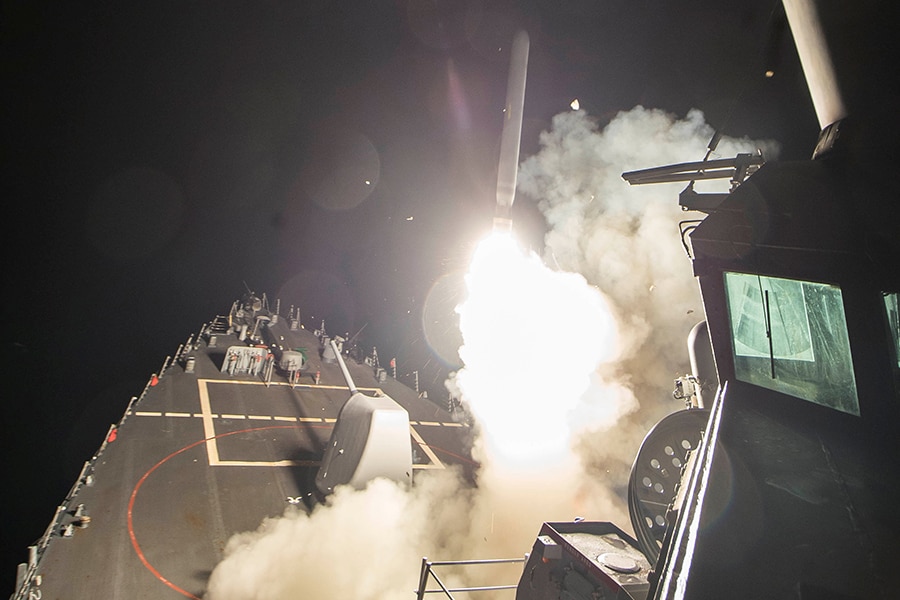
Indian stocks fall after US missile strike on Syria; bonds, gold up
Experts say US action might be a 'one-off' event but global markets cannot ignore political risks
 US Navy guided-missile destroyer USS Ross (DDG 71) fires a tomahawk land attack missile in Mediterranean Sea which U.S. Defense Department said was a part of cruise missile strike against Syria on April 7, 2017
US Navy guided-missile destroyer USS Ross (DDG 71) fires a tomahawk land attack missile in Mediterranean Sea which U.S. Defense Department said was a part of cruise missile strike against Syria on April 7, 2017
Credit: Handout / Reuters
Bond yields and gold prices rose on Friday, while stock markets indices fell as investors were spooked by news that the United States had launched missile strikes on a Syrian air base in response to a suspected chemical weapons attack on civilians in the town of Khan Shaykhun in Idlib province of north-west Syria.
India’s 10-year bond yields were up to 6.84 percent and gold prices rose to Rs 29,710 per 10 gm, up five percent over its previous close. The benchmark 30-share Sensex—which this week touched the key 30,000 level—fell as much as 258.89 points to a day’s low of 29,668.45 points, indicating that investors chose to shift to safe-haven forms of investments on fears of the possibility of rising geo-political tension across lager economies.
Asian stocks were mixed on Friday, ahead of two other events which will be closely watched this weekend. The outcome of US president Donald Trump’s meeting with China’s president Xi Jinping. The markets will also keep a close watch on the US jobs data, which is due later Friday.
The US attack—through 59 cruise missiles fired from two warships on the Syrian airbase controlled by the forces of President Bashar al-Assad —is a sign of escalation of the US’s military role in war-torn Syria but has also raised concerns over the relationship between US and Russia, as the latter has been seen as Assad’s ally.
“I do not think that initially the United States was keen on strikes on Syria. The chemical weapons attack changed the US thinking, their reaction was on humanitarian grounds,” says Shrikant Paranjpe, former professor in the Department of Defence and Strategic Studies at Pune University.
“I however think that the US might not follow [this strike] with further such moves. It might well be a one-time affair, the US would not want to be entrapped in a war in Syria,” Paranjpe told Forbes India.
The foreign investing community will keep a close watch on the developments in Syria and how other global superpowers deal with the war. “Donald Trump’s entry promised to be the start of a new world, but it appears to be looking more of the same. We thought that the political world might not be anchored around the Middle-East,” said an investment head with a foreign brokerage firm, on condition of anonymity.
Says Saurabh Mukherjea, CEO of Ambit Capital: “Last year there have been several political developments which in the normal course of action would have been the driver for an investing downside and shaken up the confidence of investors across the globe. But this has not happened. I fear that things cannot carry on like this. In one of the episodes of political tension, the global financial markets will take a pause and take a close look at these developments.”
A fund manager with a global securities firm, however, discounted the latest US strike. “The US was already in Syria… but if things escalate further, there could be some thinking,” he told Forbes India.





